discipleship
in chaos
Learn more about who we are by following our blog, written by our pastor, preacher, and chief evangelist. Engage in the everyday sacred as Abby writes about the deep and ordinary all at once.
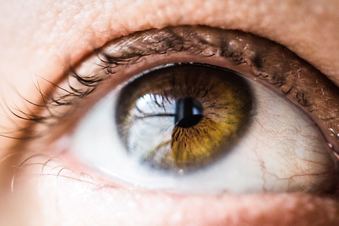 Sabbath. Remember? It’s one of the ten commandments. God is pretty clear when God commands us to take a sabbath. There is much in the scriptures that is very unclear. Sabbath is not one of them. “Remember the Sabbath day, to keep it holy. Six days you shall labor, and do all your work, but the seventh day is a Sabbath to the LORD your God. On it you shall not do any work, you, or your son, or your daughter” (Exodus 20.8). No excuses: we are to take a sabbath for a full day. Yet few of us do. If ever. Not even for half a day. People used to take the sabbath more seriously. Was it because they were more religious? Or was it because their bodies would have fallen apart if they did not rest from the exhausting toil of physical labor? I’m not sure. But I know that sabbath is important and elusive. For me, too elusive. I have discovered recently how essential sabbath is to our spirits. It was certainly essential to my family on our eighty-five day out west trip. Our entire family would reset after keeping sabbath on the road, ready for the next adventure, filled with gratitude for what we had seen, and grounded in the present. I was eager to remember this learning when we returned from our blessed sabbatical adventure a few weeks ago. (Yes, it is not lost on me that sabbatical and sabbath are related.) I wanted to hold on to sabbath. I made sure every week my calendar reserved a time for our family to have sabbath together--Friday night movie nights, Saturday campfires. I wanted to somehow hold onto the new internal clock our family had developed. But I forgot about myself. I ignored my own need to keep sabbath. Over the past three weeks, upon returning from my sabbatical, I’ve worked too much. This was to be expected. There was much to catch up on. Not to mention, I wanted to catch up, I was eager to be back at work. But then things spun out of control. For a nine day stretch I didn’t take a day off, or an evening off, or anything. I became grumpy and weary. Fortunately, the Holy Spirit seems to have an interesting and humourous way of doing her own thing. On Monday I had an eye doctor appointment, the usual see-how-much-vision-Abby-has-lost-this-year sort of appointment. The doctor informed me I was overdue for an eye dilation in order to check the health of my eyes. The doctor warned me I wouldn’t be able to read for at least two to three hours. Okay, I thought, I’ll be able to start work around 1:00. That’s fine. There were plenty of other things I could do. For some reason my eyes did not recover quickly. I wasn’t able to do any computer work or writing until late Monday evening. Really late. I tried and I couldn’t. The Holy Spirit had her way. Instead, I enjoyed a full life giving day of forced sabbath. I cooked and listened to a book and enjoyed my daughter. That night I fell peacefully asleep and did not wake in the middle of the night with racing thoughts. On Tuesday I didn’t feel frantic, wondering just how I would accomplish all the tasks before me. Instead I moved forward with my work gratefully. And it felt like overnight, somehow, my work list shrunk, as if someone else had edited it. I wonder how it would change our culture as a whole, not just on an individual level, if everyone took a day of rest? How can we in this postmodern world, where all of us carry our work around on our phones, carve out sabbath in our lives? We can’t inist our eye doctors dilate our eyes once a week, although I think that might help . . . . We have to change. We have to figure this out. We shouldn’t feel guilty when we’re being unproductive. We have to value our lives and our relationships more than success, more than our task lists, more than our wasteful busyness. The good news is that sabbath works, and keeping sabbath can change us and change the world. The challenge is to keep sabbath in a frenetic world. We need rest. We need sabbath.
0 Comments
On Facebook someone recently encouraged me to pray. This encouragement was in response to one of my many enraged posts about a policy change that would affect the poor. Pray? Did you say PRAY!? The comment sent me into orbit. Full disclosure: anything can send me into orbit these days. Like many progressive Christians, I am enraged by the current administration's rhetoric about the other, be they poor, Muslim, minorities, transgendered, et al. While commuting in my trusted mini van, angry rebuttals are shouted as I listen to NPR-- as if the commentator can hear me on the other side of the radio. Spiritually centered? Nope. Not these days. Concerned deeply for justice? Got that covered. Let us return to prayer before I digress into a debate about health care reform. After I calmed down, just a little, I wondered why this well meaning person’s post suggesting I pray made me so angry. Could it be that I found prayer anemic in the face of millions of Americans losing their health care? Martin Luther King Jr reminded his white colleagues, who often encouraged patience and prayer, that he took prayer too seriously to use it as an excuse for avoiding responsibility. Prayer is not going to ensure that millions of Americans keep health care. It occurred to me in that moment that prayer is a tool, not an objective. As one who follows Jesus, my ultimate objective is not for a more prayerful world, but a more just and equitable world. Prayer, along with activism and community organizing, are tools Christians are called to employ to seek the kingdom of God here on Earth. My Facebook friend was not wrong to suggest I pray. I admire great Christian activists, like Dorothy Day, who were committed to daily prayer. Too often, however, prayer is mistaken as the only Christian resource, or worse, the end goal of spiritual life. The American evangelical movement has been overly concerned with personal piety. As long as someone has a prayer life, it doesn’t seem to matter, for example, if they pay their employees a living wage. (The Walton Family, owners of Walmart, are a case in point.) Just a perusal of a Christian book store will confirm this: so many books on prayer, so few on justice. This singular attention to prayer misrepresents Jesus’ ministry. Jesus’ ministry--his very work-- was to turn the social order upside down. He sought justice for the poor, healing for the sick, protection for the most vulnerable, and inclusion for the excluded. He prayed in private more than in public. Mostly he stirred the pot. His sermons were like protest marches, his healing subversive. At his first public appearance in his hometown synagogue (Luke 4) he reads from the prophet Isaiah: [God] has sent me to bring good news to the oppressed, to bind up the brokenhearted, to proclaim liberty to the captives, and release to the prisoners. (Isaiah 61:1) In this moment, Jesus makes clear the objectives of his ministry. His “stump speech” makes no mention of prayer; it’s all about hope, and mercy, and liberation. 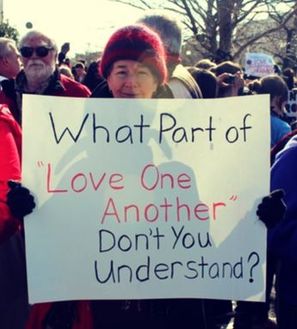 Personal piety was not a prerequisite for Jesus’ disciples, or for Jesus. More often than not, Jesus prayed alone, away from the crowds, for the courage and energy to continue. In this way, Jesus used prayer as a tool. In a rare moment when Jesus speaks of prayer, he describes it as a private affair: “And whenever you pray, do not be like the hypocrites; for they love to stand and pray in the synagogues and at the street corners, so that they may be seen by others . . . But whenever you pray, go into your room and shut the door and pray to your Father who is in secret.” (Matthew 6:5-6). Jesus never admonishes his followers to pray without ceasing. Paul does, not Jesus. Activism--phone calls, protesting, marching, writing letters, meeting with legislators, voting--and prayer, but not prayer alone-- will help ensure that an elderly person in Iowa has the medication they need and that a young mother in Texas can take her feverish newborn to the hospital. As one who follows Jesus, my goal is the kingdom-- a kingdom in which all people have health care, not just those who can afford it. Prayer is a tool for achieving God’s kingdom. Jesus sought after this kingdom, working hard to to create it, and he prayed along the way, but he did much more. So shall we. 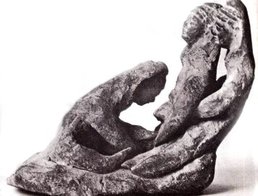 My year began on January 21st when I gathered with over 500,000 citizens (well 500 thousand plus if you embrace facts opposed to alternative facts) in Washington, DC. I stood beside my 13 year old and 10 year old boys and a dozen other members of my faith community. We listened, cheered, held up signs, waited in line for the port-a-potties, marched, laughed, and cried. Since that day I have been trying to process what I learned, what it felt like to be in a moment of history with my two beloved boys, and just what this movement means now and for the future of our country. This will not shock you if you have read any of my previous blogs: I am a progressive Christian feminist. What has happened since since Donald Trump moved into the West Wing is very concerning to me. But I am not a policy wonk or political organizer. I am a pastor, a mother of two boys and a girl, a woman, a feminist, a community leader. I haven’t had anything to add to the conversation until I preached this Sunday. Long before I headed to DC, I planned my Jan-February preaching schedule. I decided before Lent began that it would be a good idea (yes my thinking was no deeper than “this seems like a good idea”) to spend time in the Hebrew Scriptures. I like Exodus. I chose my scriptures. The first Sunday we would start at the very beginning, Exodus 1, with the midwives. Sounded like a “good plan.” I then went to DC. When I returned the story found in Exodus 1 took on new meaning. I discovered it was a story not just of faith, but of resistance. The beginning of Exodus, chapters 1 & 2, is about a group of women who cooperate, communicate, and work together across social divides to thwart a genocide. Central to this resistance movement are two midwives who, like Rosa Parks, spark the wider resistance. Their names have been forgotten as Sunday school classes learn of Moses and Aaron and their violent successor Joshua, but never of Shiphrah and Puah. We know very little about the midwives Shiphrah and Puah. But they must have enjoyed a certain level of privilege and power to be meeting with Pharaoh face to face. We can only assume they were well respected, so well respected that the Pharaoh needed them on his side. The Pharaoh orders them to kill, with their very own experienced hands, every Hebrew boy they usher into the world. They resist, knowing full well that resistance in Pharaoh's land can only mean death. Learning of their refusal, the enraged Pharaoh calls them back, wondering what has happened, “Why aren’t you killing the Hebrew babies!?” he demands. Their response traps the Pharaoh in his own ignorance and prejudice. Capitalizing on his conviction that the Hebrew people are less than human, they explain that the Hebrew women are not like Egyptian women, “they are vigorous and give birth before the midwife comes to them.” (Exodus 1:19) The word translated vigorous has a possible second meaning in Hebrew--animal like. The Pharaoh thinks that Jews are animal like. But the two midwives know better--perhaps they know that we are all human? Certainly, they know race and class have no bearing on how long women labor. So they refuse to side with the Pharaoh and refuse to accept the Empire’s “truth”. Their subversion exposes the Pharaoh’s plan and his malevolence. Soon many women become involved, including Moses’ mother and sister, and Pharaoh's daughter. Together, these women save the children. 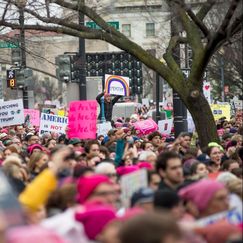 There are many things about the midwives’ story that are radically different than mine.They acted in secret; my demonstration was public. They endangered their lives; I was protected by the US Constitution and a large police presence. And I’m not nearly as famous or influential as they were. The Pharaoh met with them, but Trump won’t meet with me! (And I think we’re better off that way.) Yet I do have a few things in common with the midwives. First, as a pastor, I find myself aligned with the work of a midwife, as one who welcomes life. Much of my work is about protecting, nurturing, and celebrating life in all of its varied forms, whether that life be a transgender youth, a Muslim refugee, a homeless veteran, a hungry family, or a spiritually abused adult. Second, like the midwives, I enjoy a certain level of protective privilege. The midwives lives were never endangered; Pharaoh wasn’t after their own offspring. As a well educated straight white woman living in Massachusetts with great health care, I’m fine. Yet like the midwives, I believe that people of privilege can be a part of God’s liberating work, that we must be a part of the resistance. Finally like the midwives, I am a woman of faith. In just the few short verses in which we learn of the midwives’ stories we are told twice that they “fear God.” Although the phrase “fear God” echos uncomfortably in our modern ears, it describes someone who respected God and God’s ways. I marched in Washington because I am a feminist, because I value progressive social policies, because I am rearing a girl, but mostly I marched because as a Christian I have been called to honor God’s ways. God values life-- all life. God values the life of newborn Hebrews and crotchety old Egyptians. God values the life of Mexican immigrants and angry American nativists. God values the life of women making difficult choices about their future. She values the life of LGBTQ+ folks, straights, Muslims, Christians, refugees, and everyone who lacks power. In Shiphrah and Puah we encounter ordinary women who act courageously to defy authority, to do what they believe to be right. Their story is but one of many accounts in the Hebrew Bible of people whose faith confronted the intimidating power of oppressive authority. Let us, as people of faith, not grow complacent. Let us as people of faith, especially if we are in positions of privilege, resist. Let our courage speak louder than the fearmongering lies that power foists on us today. 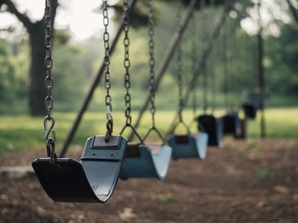 If you are looking for faithful prayer, please read my colleague Mary Luti’s blog entitled, And Love is Everything: A Newtown Carol. Poetry often expresses what prose cannot. I am grateful for her words: Love is a sea of sorrow, love is a broken wing; love has no guns, no forces, love cannot win a battle: And love is everything. If you are willing to be present to the empty, please continue to read. 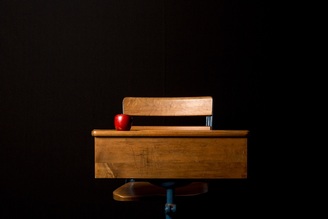 Sandy Hook. December 14, 2012. Adam Lanza. 20 children between ages 6 and 7. Six adult staff. The deadliest mass shooting at a school in US history. The third deadliest mass shooting in US history. On December 14, 2012, my sweet freckle faced boy was a first grader across the street at our public elementary school. Now my daughter is a first grader at the same school. Today she is probably doing any of the following things at school-- mastering her pencil grip, learning short vowel sounds, working on her addition and subtraction facts, listening to her teacher read from their latest chapter book, absorbing what it takes to be a positive member of a community, and daydreaming, because 1st graders still have permission to daydream. I walked her to school this morning like normal. I watched the bounce of her ponytail and kissed her goodbye before she ran happily into school, eager to begin her day. I am deeply grateful that my daughter is seven and totally oblivious to this day’s history. Totally oblivious that some mom just like me walked their child just like her to school, confident that elementary school is a safe place. The shooting prompted renewed debate about gun control. I was certain the death of twenty small children would finally tip the balance. Nothing changed. Our culture's obsession with guns persists. Most political leaders remain cowards, more willing to talk about the death of an aborted fetus than innocent kindergarteners and first graders. If we had paid as much attention to Sandy Hook as Benghazi, would that have helped? Nothing has changed around gun laws, but I will tell you what has changed. Twenty families have one less stocking to hang this Christmas. Countless other families still wonder why their child was spared. First responders still wake in the middle of the night from ceaseless nightmares. A new school has replaced the site of the killing and a memorial garden has been planted over the rubble of the classrooms where 20 kindergartners and 1st graders were shot dead. But has anything changed outside of Newtown, CT? I can still keep December 14th at arms length even if my heart aches for the families of the victims. I know viscerally what it is like to love a first grader, yet I am still confident that my first grader is safe. For me, little has changed. That is the shameful truth I must confess. What are we to make of this senseless violence, knowing that their deaths didn’t at least prompt change? What should we do this day as faithful people? One thing we can do is lament. The Biblical book, Lamentations, means how in Hebrew. To actively lament means to let out anger and grief, to cry out “Enough!” and ask “How God, how?” I learned in my pastoral education that lamenting is essential to the healing process. We were told to honor the lamentations of those we serve and that in doing so healing would eventually come. We were told that faithful lamentation makes our grief holy. Today, as I returned home from walking my daughter to school, I decided that what I learned in seminary was a crock of shit. Lament isn’t sacred. Yes, it should be spoken and heard. Yes, I do believe God bears witness to the cries of those keening with grief. But I know that lament isn’t always followed by healing. I refuse to say the “comforting theology” I was trained to speak, that lament transforms grief into something holy. There is nothing holy or sacred about 20 small bloody bodies. Nothing. No lament can make it so. My one offering on this horrid day--lament-- has come up empty. The lament I offer beside the lament of the mother who cannot get out of bed today, remembering the way her beloved child looked before she dropped her off at school, is feeble. Empty. Futile. Feeble. Guns still proliferate. Our nation still bleeds. And twenty children are still gone. How long O Lord, how long must we wait for guns to be banished from our nation? How long until the abominable violence stops? How long? 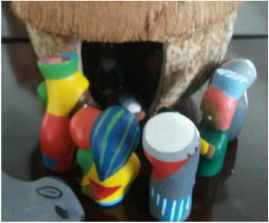 My seven year old and I decorated our home with nativity scenes from all over the world. As a child I loved to carefully set up the creche in my mother’s recently emptied hutch. I had just a way to place the angels and shepherds. I often attached Jesus’ widespread arms to Mary for it made sense to me that Mary would be holding her newborn babe. My Lydia is as attentive as I was, but her preoccupations are different. To this day, I always place each nativity piece turned outward, last-supper-like, so that the onlooker can see each figure. Mary is always near Jesus and over her shoulder the others look. Lydia’s scene is different. Mary and Joseph are tightly huddled around Jesus. The other pieces encircle the new parents and babe, often their backs turned to the viewer. I have restrained myself this Advent; I haven’t rearranged Lydia’s presentation. They were hers to set up and she visits them daily. 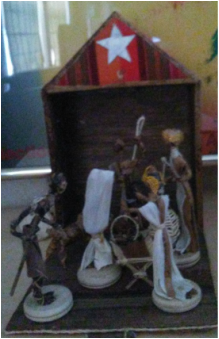 I asked her about one scene, “You can barely see Jesus, he’s tucked inside so.” She responded with clarity and exasperation, “You want him out of the rain, don’t you?!” Those who heard the angels’ choir and followed a star were fully immersed in the scene before them. They beheld a perfectly normal infant who promised to change everything. He was born, as Mary tells us in her revolutionary song, to turn the world upside down. The child in the manger will show his strength by scattering the bluffing braggarts. He will knock tyrants off their high horses and pull victims out of the mud. He will invite the starving poor to a banquet and leave the callous rich out in the cold (Luke 1, Eugene Peterson’s translation). The shepherds and visitors from the east came to see the child of Mary’s song. They did not come so they could be remembered years later as small wooden and clay figures. They did not come to establish a cozy quaint holiday. They came to behold. Lydia seems to know this. Her figures all look at Jesus, gathered around, urgently waiting for what would happen next. 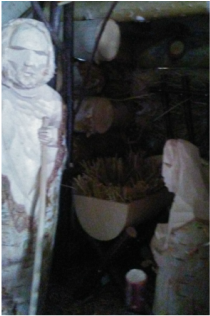 This Advent season, I am looking in with Lydia, and with the shepherds, angels, and wise men. My neck is stretched, my feet are arched, so I too might catch a glimpse of the child who will change the world. I am watching intently even though outside the manger the world spins out of control: hate has become ordinary public discourse, threats are effective communication. I keep my eyes steady in hope that once again the world will be turned upside down, that once again the bluffing braggarts will be scattered, the tyrants knocked down from seats of power, and the callous rich left out in the cold. Perhaps I’m looking in because I can’t bear to look out. Or maybe I’m looking in because I hope. Some might call my hope naive, but this is the same hope that has sustained all the saints I revere--Dorothy Day, Martin Luther King, Jane Addams, Cesar Chavez. They persevered through the Wilderness, their eyes set on the Promised Land, leading America into God’s imagination. I choose to hope like they did. And I join an earnest seven year old who knows--intuitively and intimately--that something powerful happened in a manger 2,000 years ago, something worthy of hope. 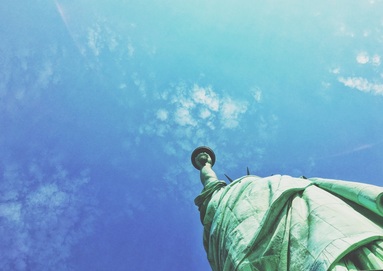 Today we weep, tomorrow we... ORGANIZE ACT LOVE STRUGGLE As a very bright and faithful friend, Dani Forbess, wrote on Facebook, “The road forward is only as big and wide as the narrative we are able to make for it.” What sort of narrative would you like to create? As a religious leader I am suppose to have answers, but I have none. Instead I only have an invitation. GATHER with your PEOPLE at Grace on this Sunday, November 13th at 5:00. More Information Why would you gather with a religious community, especially if you are non-religious, or better yet terrified of religion? Well, because first most of us are too, but second and more importantly, we all need one another. We need a safe place to begin to talk, think, and answer “What now?” We need a place where together as community we can begin to address the following:
If you can’t come, please do all and any of the following:
I leave you with this word: ARISE. From the depths of despair, I hear The voice calling... "Arise." Arise and love. Stay present and love. Stay angry and love. Seek peace and love. We have seen fear control and distort good people. I hear The voice saying, "Do not be afraid." Only love can trump hate. Only love can conquer fear. Do not be afraid -Mary Jane Eaton. This is a picture of my daughter Lydia and her pantsuit wearing feminist mother on our way to vote for Hillary Clinton. . I wrote the following blog yesterday. It was ready to publish first thing this morning. I so yearned for this moment that I could feel my daughter's warm body in my arms, her earnest eyes looking at me, as I told her a woman was now our president. Now I must tell my daughter that sometimes a bully wins, and that when a male bully faces a woman in America he will win. I must prepare her for a deeply misogynistic culture.
And yes this is what it comes down to for me. Misogyny. The dislike of, contempt for, the ingrained prejudice against women. What other explanation is there? How else would an ill prepared, angry narcissist win the presidency against one of the most qualified, intelligent candidates in American history? I think the answer is simple: America is still a deeply misogynistic culture. May this hopeful, premature blog be a lament. May it be a remind us of who we should be. May it propel us to continue the struggle: This moment will forever mark our nation. Many powerful essays will claim this day in American history. But I only have one simple story to share, one simple name: Lydia. Lydia is my seven year old daughter. She has come to political consciousness under a black president. This summer she watched her first political convention and saw two women own the podium: Michelle Obama and Hillary Clinton. This fall she watched snippets of the presidential debates and shouted with glee as Hillary Clinton gracefully and intelligently stood up to a bully. Over these past few months she has also been flexing her muscles and proclaiming, “I’m a strong woman!” We didn’t teach her to do this. I have waited for this moment since I was 17 when I understood for the first time that my gender limited my opportunities. I have ached for more women in powerful positions since I began a profession dominated by men. My daughter hasn’t waited, ached, or yearned for this historical moment. Instead, she will simply wake this morning and embrace this moment. Her sleepy pajamed body and blonde bedhead will shuffle down the stairs. As she curls into my lap, I will tell her that Hillary Clinton, a woman, has been elected president. I will tell her to seal this moment forever in her memory. I will tell her of all the women who struggled tirelessly for this day to happen. And I will remind her that all day long--and for the rest of her life--she should continue to flex her arms and declare, “I’m a strong woman!” For this day I am deeply grateful. Recently, I came across this blog from November 2013. It still speaks to my heart on this All Saints Day as I give thanks for my Baba. 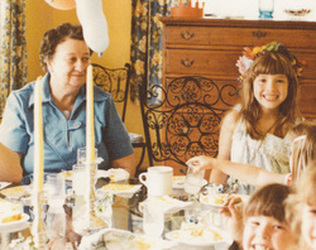 The Christian holy-day All Saints is really a pre-Christian (pagan) holiday reclaimed. Shocking! Say it isn’t true! The truth is most pre-Christian holidays morphed into reclaimed Christian holy-days. My favorite is All Saints. Traditionally pagans celebrated a day called Samhain, what we typically call “All Hollows Eve” or Halloween. Samhain was the beginning of the New Year; on the eve of the coming year it was believed that the veil between life and death, this life and the next, was thin. I have some Pagan friends.* I love them. Their traditions inform and challenge mine. Recently during Samhain I asked them to listen for my Baba. Yes, an ordained minister asked her “witch” friends to keep an eye out for my former babysitter Dorthy Sponholz who I lovingly called Baba. And then without any trouble I led an All Saints Day Christian gathering and preached about my pagan friends’ very real connections to the dead. It was a beautiful gathering during which we honestly laid our thanksgiving filled grief before one another in community. Again: Shocking! Pagan and Christian practices mingle. Call the Orthodox Police! I would like to think we have come a long way from the days when “Christians” use to burn their pagan neighbors at the stake. Too often people believe that saints are some or all of the following: famous, martyred, miracle performers, extremely pious to the point of weird, dressed in long robes and huge crosses. Wrong. Saints are the very real and ordinary people in our lives who simply loved us to God and then died. Some saints are famous. But most are not. My beloved Saint Baba was not an extraordinary person. In fact, she was simple. But her simple love transformed me. Saints are no different from the spirits Pagans connect with on Samhain. They are the dead who are inexplicably with us. How we understand this “with us” is debatable, but who cares! This All Saints Day my dear friends helped me understand that I did not need them to connect me with my beloved Baba. Instead, I was already connected to her. I have always been in communication with Baba through what I call prayer since her death 25 years ago. I just didn’t know it because my Christian forbearers were trying to hide their pagan roots. My religious leaders didn’t let me know how close the living and the dead mingle, probably because they had no idea themselves. In remembrance of All Saints Day, in thanksgiving for my dear pagan friends, and in celebration of the many ordinary saints and their transformative love I would like to tell you my favorite Baba story. One morning my mother dropped me off early to Baba’s house; she had a meeting. Baba fed me breakfast at her Formica kitchen table and then it was time to catch the bus. It was pouring. I put on my rain jacket, but even my hood could not keep the rain from pouring down my neck. Instead of waiting at the edge of Baba’s driveway, I ran back to Baba’s porch. When the bus came it did not see me and passed by, leaving me with no ride to school. Drenched, I walked back into Baba’s house, afraid she might be angry. I confessed I had missed the bus. I now know this was one of my best mistakes for it turned into a great adventure. Baba didn’t want to wake her husband Carl. She decided she would drive me to school. Baba hadn’t driven in 15 years. Her husband Carl did all the driving in their old brown station wagon. I was a bit scared when Baba put on her coat and boots and tied a plastic bag around her recently set short curls. We hurried to the safety of the brown wagon and Baba started her up. I sat beside her in the front seat, watching the road intently, certain Baba needed my pair of eyes. The wipers could not keep up with the deluge of water. Baba and I were silent for a moment as she pulled out and started down the road, the squeak of the wipers the only sound in the deafening rainfall. And then Baba laughed. I don’t know the last time I’ve drove! The car feels so heavy. Was that a bad thing I asked?No, no. I just don’t remember it being so heavy. And then she laughed some more. On the rest of that adventuresome ride to my elementary school, I was aware that I was the only person Baba would drive for. I was the one Baba loved best. The love present in that rainy morning 29 years ago sustains me today. Remember your ordinary saint and bask in their love this day. 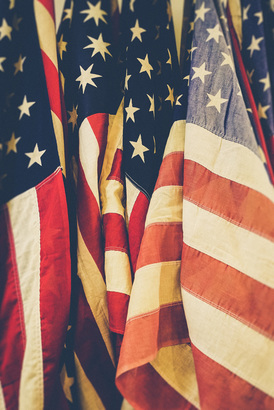 There are many days I am ashamed to call myself an American. This shame has settled like a heavy rock in the pit of my stomach this fall. I also struggle deeply with calling myself a Christian (read my former post). These struggles are similar, yet I cannot deny either of these identities. If I like it or not I am an American, just as I am a christian. Much of who I am is a result of the physical origin of my birth, even more so than the supportive family in which I was reared. My identity has been shaped by American culture for better or worse. As an American citizen there is much to be proud of and more to be thankful for. I can write you a long list including security, education, freedom of speech, and prosperity. I know the list is longer than that. I also know the list of things that I am ashamed of as an American citizen is long. For every blessing that American bestow, it seems there a corresponding sin. The American constitution declared that all men were created equal while one in four Americans were considered less than human because of the color of their skin. America expanded west, offering free land to thousands of immigrants who had never owned land in their life; but we stole this land from American Indians. Americans mobilized as a community to defeat fascism in Europe while we imprisoned Japanese Americans. These gifts and curses, blessings and sins, are present in most nations’ histories. The way forward is to learn from our sordid history, acknowledge and repent for our wrongs, and create a new future. Why then, am I, a relentlessly positive person, hanging my head in shame these days? The recent hate that has riddled our national discourse and divided us as a country has left me ashamed to be an American. Perhaps more precisely I’m ashamed to hold the same national identity as those who desire walls, scream racists epithets, condone misogyny, advocate imprisonment without trial, disregard years of international community building, demand Muslims be registered, ignore science, worship guns, and denounce everyone and anyone who is different. I’ve been hanging my head in shame, embarrassed to be an American, just as I was embarrassed to be a christian when the mainline church was outwardly denying my LGBTQ sisters and brothers their right to marriage and ordination. I am just ashamed. But then something happened. Grace. In the faith community in which I serve, the communion table is wide open. When I say wide open, I mean wide open. We are explicit that everyone is welcome to the table: children, infants, agnostics, atheists, every faith tradition, every gender and orientation and identity, every race and socio-economic class. Everyone is offered the same gifts of grace--the simple bread and cup. Everyone counts at the table. Every morsel, every sip is grace joyfully and abundantly offered. Class lines disappear, who uses what bathroom does not matter. Instead we joyfully celebrate that everyone is a beloved child of God. On November 8th, America will celebrate it’s very own communion table. Like the table, everyone is welcome to the voting booth. Everyone. Part of our shameful past is that this has not always been true. Up until 1920 women were excluded from the voting booth; then the 19th Amendment to the Constitution was passed. Many African-Americans were unable to vote until 1965, when the Voting Rights Act was passed. Thankfully our upcoming Election Day is something of which we as Americans can be deeply proud. On November 8th there will be no armed guards in the street. Bosses cannot tell their employees how to vote and demand that they do so. The rich can’t pay the poor to vote a certain way. Voter intimidation will be illegal, and those laws will be enforced. There will be no fear of lost jobs or homes because of an individual choice. Some might argue the system is corrupt, but each ballot will be counted. The well greased machine of our democracy will run smoothly and a victor will be announced late that night. And in Walpole, Massachusetts, on November 8th I will be very proud to be an American as I remember everyone, Republican, Independent, Green, Democrat, Libertarian, undecided, everyone, is welcome to vote. Perhaps once again I will hold my head high as an American. #everyvotecounts #proudtobeanamerican #november8 Yes, thank you. I mean it. Why? Because as my wise clergy friend pointed out: your “locker room talk”, Donald, has finally ignited a conversation that has needed to happen for sometime.
Imagine the scene. Yesterday, I was at a knitting circle in a church parlor. At forty, I brought down the group’s average age by 20 years. The women in the circle are long time New Englanders and progressive, but traditional, Christians. They are not bra-burning feminists. As a rule of thumb, they avoid conversations about sex, especially conversations about sexual harassment and violence. But not yesterday. They willingly discussed the locker room and Donald Trump. I am positive some of these ladies have voted Republican in the past, but not one of them will be voting for Donald Trump this election cycle. They were horrified. They wondered together how often these sort of conversations truly happen among men in closed circles. Some of them acknowledged they “knew of” men who used “filthy, unspeakable words” in regards to women, but was this common? They were angry. Why was it okay, they asked, for men to talk about women that way? Why were their bodies open for discussion? Imagine. I found myself openly discussing the vulgar words used for vagina with a group of 60-70+ year old women. Then I shared my story and they listened. In high school I dated a boy on the football team. In the locker room some of his teammates starting harassing him about his relationship with me. Was he going to fuck me? Was he going to do it doggy style? We were both virgins. We had made a conscious choice that we weren’t ready at 15 and 16 to have sex. His teammates must have have guessed at our choice. My boyfriend was an easy target. And according to them I was a hot one who should be conquered. My boyfriend didn’t say anything. Nor did my brother who was also in the locker room. They didn’t know what to say. My boyfriend confessed later to me what happened, ashamed that he didn’t know what to do. My brother also spoke to me, wanting to make sure I was careful around the boys who spoke about me as if I were a simple sexual conquest. My brother was also ashamed and befuddled. What was his role? I was furious with both my boyfriend and brother for not standing up to the locker room talk. When my mother found out she was enraged and my poor brother received a mouthful. 25 years later I am not angry at my high school boyfriend or brother. They didn’t know what to do. They knew it was vile and were ashamed. Yet in their defense, no one explicitly said to them, “You never speak about women (or men!) as sexual objects using vulgar words that you would never say in front of your grandmother.” They knew it was wrong because they were raised by good men and women, but they also knew women were spoken about as sexual objects openly in society. Vulgar words were just reserved for the locker room out of their grandmother’s ear shot. Well, thank you Donald Trump. You have now made it clear to America that we need to have these conversations. We need to have them in knitting circles and in locker rooms. We need to have them in youth group and in boy/girl scout meetings. We need to have them at our dinner tables and in our mini vans. We need to tell everyone that we should never ever EVER talk about women or men with such sexually demoralizing terms. Here are some tips for the conversation when your 12 year old asks for greater clarity:
Let’s end locker room talk here and now. #endlockerroomtalk |
Abby HenrichRev. Abigail A Henrich (ehm!) is an ordained minister who earned her stripes at Princeton Theological Seminary and Colgate University. That said, Abby is really a mother-pastor-spouse who lives in a kinetic state of chaos as she moves from her many vocations: folding laundry, preaching, returning phone calls, sorting lunch boxes, answering e-mails, and occasionally thinking deep thoughts in the shower. Unabashedly she is a progressive Christian who believes some shaking up has got to happen in the church. Categories
All
Archives
March 2024
|